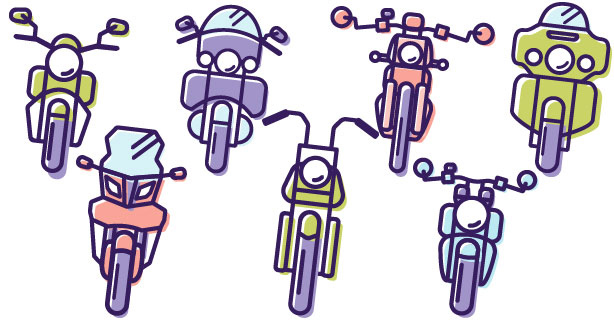Get to know 7 common types of motorcycles
0 min. read
Identifying your ideal bike depends on several factors, including your riding style, your budget, and whether you prefer modern bike design or lean more old-school.
Here's an overview of seven common motorcycle types you can expect to encounter out on the road. If you like what you see and you're thinking of buying a bike of your own, check out our guides to purchasing and insuring your motorcycle.
1. Standard bikes
Standard motorcycles offer an upright seating position with the handlebars located at a comfortable distance so you're able to relax your arms while riding. Plus, they're often available at a lower price point than some of the other types we cover below.
Keep in mind that standard motorcycles typically have less powerful engines than some other types, such as sport bikes and choppers, so if horsepower is your top priority, you may want to look elsewhere. But if you're looking for a comfortable, steady, workmanlike bike, a standard motorcycle could be right for you.
2. Cruisers
These bikes are designed to be comfortable for long rides and offer ample storage space. Unlike standard motorcycles, cruisers have low saddle heights in relation to the handlebars and gas tank, allowing you to maintain a relaxed riding position. This makes them ideal for straightaways on well-maintained highways. You can take on winding roads as well, but you'll need to keep your reduced ground clearance and lean angles in mind.
Cruisers were developed in the 1930s and have been a favorite for riders ever since. When you picture a classic, American-made motorcycle, there's a good chance you're envisioning a cruiser. Cruisers may not be the fastest motorcycles on the market, but they make a truly nostalgic statement.
3. Sport bikes
Sport motorcycles are optimized for speed, acceleration, and braking. They place you in a forward leaning position with the handlebars set low and foot pegs located rearward and a bit higher up. Combined with generous ground clearance, this allows for higher lean angles. This riding position places some of your weight on your arms and wrists, however, which isn't especially comfortable on long rides.
If you have a need for speed—within reason, of course—a sport motorcycle may be for you. These bikes are nimble, powerful, and fun. Just make sure your riding style matches the bike's features and intended purpose.
4. Touring bikes
Touring motorcycles are designed for long, comfortable rides as you tour the country’s best routes and sites. They feature tall windshields to help protect you from the elements, and large gas tanks so you can clock more miles between fuel stops.
Touring bikes offer an upright yet relaxed seat position, so you can stay comfortable for the long haul. If you’re planning to ride your bike from coast to coast, this motorcycle is a great choice.
5. Sport touring bikes
As the name suggests, sport touring motorcycles combine features of sport and touring motorcycles. They're optimized for performance like sport bikes, and offer the long-distance abilities and seat comfort of touring motorcycles. Many riders who use their bikes for daily commutes and weekend road trips opt for sport touring bikes.
While these motorcycles lack the agility of the best sport bikes and the extra storage of touring bikes, they more than make up for it with their versatility.
6. Choppers
Choppers date back to the 1950s, when they were originally modified from standard motorcycles. These custom bikes feature high handlebars and low seats, a unique design that's comfortable and eye-catching, but can make turning difficult.
As a result, if you're just getting into riding and are looking for your first motorcycle, you may want to look elsewhere. However, if you're an experienced rider who wants a stylish bike and likes highway or freeway rides with minimal turning, a chopper is a good option.
7. Café racers
Café racers combine the look of a classic motorcycle with the speed of a sport bike. They originated in London in the 1960s as a style of sport bike, but quickly became a category all their own.
If you’re looking for a lightweight motorcycle that offers some retro flair with modern handling for short rides, the café racer could be the bike for you.
Beyond these seven types, there are even more options to consider. From subcategories and hybrids of the bikes listed here to a variety of other categories, there's a motorcycle out there for everyone.
Related links
Once you purchase a new motorcycle, the next step is making sure it’s properly insured. Check out our motorcycle insurance recommendations for everything you need to know.
The general information in this blog is for informational or entertainment purposes only. View our blog disclaimer.
*Data accuracy is subject to this article's publication date.







